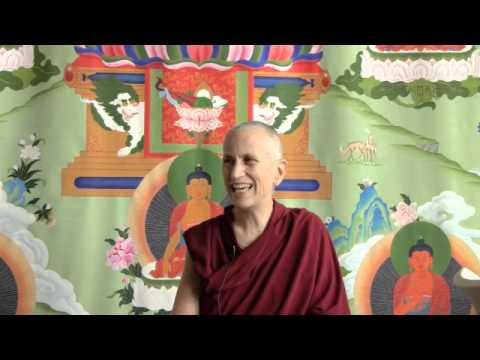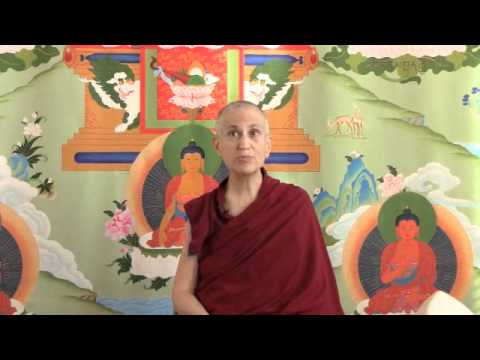Making friends with ourselves
Making friends with ourselves
Part of a series of teachings given at the Winter Retreat from December 2011 to March 2012 at Sravasti Abbey.
When we’re doing retreat, we’re learning to become good friends with ourselves. It’s very important—in our practice and in our lives in general—to be friends with ourselves. Many of us don’t like ourselves very much. We can see that through all this negative talk that goes on in our minds: “I’m no good at this. I have this problem. I’m ugly. I’m fat. I’m too thin. I’m stupid.” We have all sorts of identities that we believe in and repeat to ourselves again and again. And a lot of these identities make it very hard for us to be friends with ourselves.
But since we live with ourselves 24/7, it would be really nice to be friendly with ourselves. Don’t you think? Wouldn’t it be nice to look at this person and say, “This person is kind of nice!” When we’re buddhas, then we can really say that completely. But even in the meantime, even if we’re not buddhas, we can focus on the things that we’re doing well.
Not getting stuck in our faults
We recognize our problems and our faults, but let’s not recite them every day, all day like some kind of catechism we learned. We all know we have problems, but let’s look at what we do well, and let’s look at the progress that we have made. I think that’s very, very important. It’s especially important when you’re doing retreat because you’re going to be primarily with yourself even though there are other people around. We see all different kinds of things about ourselves. And we’re so used to seeing the negative things about ourselves that sometimes we get really stuck in them.
It’s important to understand that we’ll see negative things and different stuff will come up, so we look at it and we acknowledge it and we work with it. But it’s also very important to emphasize to ourselves what our good qualities are and what we have accomplished so far in our Dharma practice. This is very, very important because if we can’t see good qualities in ourselves, how are we going to see them in others? If we can’t acknowledge that we have the potential to become a fully awakened being, how can we acknowledge that others have that potential? If we can’t be kind and compassionate towards our own mistakes and faults, how are we going to become kind and compassionate towards others?
Kindness is not self-indulgence
When you practice being kind to yourself and seeing your good qualities don’t think, “I’m really being selfish doing this.” Because you’re trying to see the reality that’s there, and we are not one-hundred percent bad. There is a difference between being self-indulgent and being kind to ourselves and seeing our good qualities. When we see our good qualities, we’re seeing reality. When we’re getting arrogant or conceited or proud, then we’re seeing qualities that aren’t there.
You see, there’s a difference. We can see the good qualities but without overinflating them and going to the extreme of getting arrogant. In the same way, we can be kind to ourselves without being self-indulgent. Being kind to ourselves means we forgive ourselves. We have some patience and tolerance and acceptance of ourselves. Self-indulgence means that we pile all the sense pleasures on ourselves and think the whole world revolves around us. Those two things are very different, aren’t they?
It’s really important as we meditate and during our retreat practice that we differentiate this; we can acknowledge our good qualities without exaggerating them and becoming arrogant. And we can be kind and compassionate and forgiving towards ourselves and distinguish that from being self-indulgent and self-centered. Maybe write this down and look at it every few days and remind yourself of this. Because this is something that’s very important for your spiritual practice as well as for just functioning in the everyday world in a good way that works and in a way where you can tap into your love and compassion and show those to others.
So, if you don’t remember this then you’re really bad! [laughter]
Venerable Thubten Chodron
Venerable Chodron emphasizes the practical application of Buddha’s teachings in our daily lives and is especially skilled at explaining them in ways easily understood and practiced by Westerners. She is well known for her warm, humorous, and lucid teachings. She was ordained as a Buddhist nun in 1977 by Kyabje Ling Rinpoche in Dharamsala, India, and in 1986 she received bhikshuni (full) ordination in Taiwan. Read her full bio.


